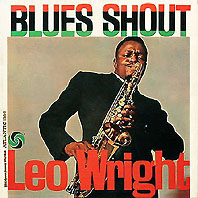 |
DISCOGRAPHY PART 1 |
 |
|
| biography 1 2 3 |
| abbreviations of instruments |
| acc = accordion as = alto sax b = bass bar-s = baritone sax bgo = bongo bs, bsx = bass sax c, cel = cello cl = clarinet cga = conga clav = claviola = hca co = cornet |
dr = drums el-b = electric bass engl-h = english-horn fl = flute fl-h = flugel-horn fr-h = french-horn g = guitar h = horn hca = harmonica keyb = keyboard ob = oboe |
org = organ p = piano perc = percussion ss = soprano sax perc = percussion ss = soprano sax tamb = tambourine timb = timbales tb = trombone tp = trumpet ts = tenor sax |
tu = tuba v = violin vib = vibraphone voc = vocals ww = woodwind arr. = arranger comp. = composer cond. = conductor dir. = director prod. = producer |
| Most of the information come from the Internet, therefore it may not be complete. The several web-sources vary in their specifications, so some details may be confusing. |
| Leo Wright with unknown personnel (unissued) recorded: February 21, 1962 in NYC for ATLANTIC Statements And Responses Billie Oh My Billie So In Love |
||
| Review: Suddenly The Blues reveals that Leo Wright possessed equal doses of talent on both alto sax and flute, both of which assumed a fluid and assertive tone that commands the attention of the listener. In fact, he worked in a soulful sensibility and decectively complex technique not unlike Lou Donaldson’s, most notably on 'Sassy Lady'. His flute work on 'The Wiggler' is reminiscent of the “coolness” and quirkiness of Quincy Jones’ theme 'Soul Bossa Nova', most recently re-discovered on the soundtrack of Austin Powers 'The Spy Who Shagged Me'. This LP is interesting as well because it captures Ron Carter’s work just after he left Bobby Timmons’ group and before he joined Miles Davis’ most famous quintet, for which he’ll forever be known. Wright allows Carter to take several solos, including some low-end work on 'The Wiggler' that adorns the humorous theme of the tune with another perspective of music imitating human movement. Kenny Burrell, a friend of Leo’s, seems excessively restrained on some of the tracks, especially on 'A Felicidad', a bossa nova standard on which one would expect more of a guitar presence. However, Burrell does break loose on 'Gensel’s Message' with his unfailing taste, richness of tone and logic of harmonic ideas. The problem with Suddenly the Blues is that suddenly | 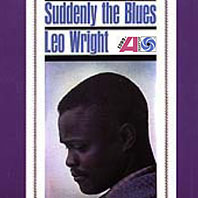 click image to enlarge
|
Suddenly The Blues / Leo Wright recorded: April 23, 1962 in New York City original release: 1962 ATLANTIC 1393 re-issued: February 2000, KOCH JAZZ INTERNATIONAL KOC-CD-8544 ; #1 & 4 also on 7 inch ATLANTIC RECORDS 45-5027 LEO WRIGHT (as on #1,3,7,9; as & fl on #5; fl on #2,4,6,8); LALO SCHIFRIN (p on #6); KENNY BURRELL (g); RON CARTER (b); RUDY COLLINS (dr)
|
||||||
| Original liner notes by Gary Kramer It is notoriety of the literary world that every writer's second novel gets paned. A parallel to this exists in jazz. Many a musician who thought he was well-launched with the glowing reviews of his first LP has been shocked to find himself foundering on the critical reefs upon the issue of his second. Leo Wright, flutist and alto saxophonist, on the occasion of his debut LP 'Blues Shout' (Atiantic 1358), got a magnificent send-off from jazz critic Leonard Feather and went on to receive other kudos from a wide circle of enthusiastic critics and fans. In his new album, his second, Leo has more than handsomely realized the promise that was tantalizingly put before us in 'Blues Shout'. The distinction of the material and the brilliance of the performance guarantee that Leo will assuredly suffer no bush-whacking from the critics or apathy from fans. An album like this actually represents the most exacting kind of challenge to a musician. Leo chose to work with a smaller group, one with less obviouc coloristic contrast than before. That has its pitfalls for any but the master musician, for with such a transparent instrumental texture, no bluffing or fake fillin is possible. Leo admits that he did worry that a quality of "emptiness" might conceivably result from such a spare, piano-less instrumentation. At the recording session, however, he was completely self-assured, in fact, "more relaxed than I ever was in my life", he says. The solidity of the writing and the dependable musicianship of his colleagues comfortably carried the day. Their 'message' is richly articulate and never lacking in continuity or drive. Leo gives much credit to the musicians he chose to work with him: Kenny Burrell, the guitarist on so many important modern jazz recordings; Rudy Collins, drummer with Dizzy Gillespie the past year; and Ron Carter, bassist with the Bobby Timmons Trio. The great pleasure given by an album like this is that it lets you in on a musician's inner feelings and thought processes to an extent impossible when he is soloing in a bigger and gaudier ensemble. "It is so easy to overdo", Leo says. His conscious aim, in both his playing and his writing, is "to express myself with simplicity and directness, minus clutter and pretense. From studying the records of Charlie Parker and from working with Dizzy Gillespie, I have learned that simplicity, clarity and economic organization of musical materials are the marks of really great jazz performance, and not just being able to play very difficult music." Leo, like his idols Bird and Diz, is nevertheless the consummate technician. That he should rank with the very top flute players in jazz, however, strikes him as a bit of an irony, since he feels that he really was "pushed" into playing that instrument. His father, a professional alto saxophonist, taught him how to play the alto when he was still a boy. He naturally considered it his major instrument, although he studied others, ineluding the flute. When he was drafted into the Army, it seemed that good saxophonists existed there in great number, but as a flutist, he readily found a berth in an Army orchestra overseas. Again, once he became a civilian, he enrolled at San Francisco State College, only to find that one couid not take a music degree majoring in saxophone, but that one could, playing flute. |
His first big break professionally also came because of his known ability on flute. Dizzy Gillespie features the flute in many of his compositions, and so in 1959, needing a first-rate man to replace flutist Les Spann, he summoned Leo to take his place. He remained with Dizzy for three years, and has only recently resigned from the Gillespie Quintet in order to form a group of his own. Fortunately, all this has not obscured the fact that Leo Wright is one of the most talented and imaginative alto men to have come upon the jazz scene in the Sixties, and in this album he can be heard in almost equal amounts on both flute and alto sax. The tunes were chosen for variety and general appeal. Leo selected a few well-known standards, but also composed several original tunes for the date and invited two friends, Tom McIntosh and Lalo Schifrin, to contribute something special of theirs. Detailed analysis would spoil the light-hearted spirit in which Leo's recording session took place, but a few explanations may add to your enjoyment of the music: 'Willow Weep For Me' represented a "challenge to me", Leo says. "I wanted to do it in a new way. I put a lot of the blues into it, and so I believe that the way we do it, it is really a 'blues ballad'. 'Dionysos' is the Greek god of wine. Lalo Schifrin, who wrote the suite Gillesplana, in which Leo soloed so brilliantly, dedicated this to Leo, not because he drinks wine (take my word for it, he doesn't), but because this god is usually represented as playing a flute. 'The Wiggler' is a twelve-bar blues affectionately dedicated to a friend of Leo's known as 'The Wiggler'. He runs the Sutherland Lounge, a jazz spot on the Chicago South Side. 'A Fe- licidad' is a lovely melodic theme from the film 'Black Orpheus'. In this reading, Leo utilizes the currently very popular bossa nova rhythm with taste. 'Tali' is the first name of a friend of the composer, Tom McIntosh. Leo first came to admire McIntosh because of some composing and arranging the latter did for James Moody. He especially liked the way McIntosh handled flute. By the way, Tali is from Iran and her name in Persian means "Dawn". 'Sassy Lady' is a sixteen-bar blues dedicated to "Sassy" (Sarah Vaughan). The composer says he "was trying to get two melodies going here, a contrapunctal thing between guitar and sax". This is a very enjoyable blues, real "down" and earthy. 'Gensel's Message' is a tribute to the 'Jazz Minister', Reverend John Gensel of New York. He brings other clergymen to jazz spots to listen to jazz and to get to know musicians and their problems. Gensel has also invited musicians like Charles Mingus to play jazz in his church services. 'Greensleeves' is a favorite folk tune that Leo Wright often played with Dizzy's group. Arranger Tom McIntosh's unusual handling of the melodic line is an interplay between the Aeolian (melodic) and Mixolydian (melodic minor) modes. 'Suddenly The Blues' has a spontaneous feeling to it that can be explained by the fact that it was indeed improvised and unrehearsed. Having finished recording all the material for the session, a little time remained. "So suddenly we just started playing the blues", Leo says. Hence the title. This is a tremendous album - exciting, happy, unfeilingly swinging! | ||
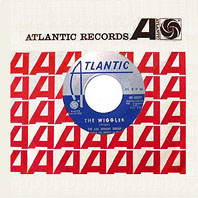 |
The Wiggler / The Leo Wright Group recorded: April 23, 1962 in New York City issued: 7 Inch / 45 RPM, ATLANTIC RECORDS 45-5027 LEO WRIGHT (as on Side A; fl on Side B); KENNY BURRELL (g); RON CARTER (b); RUDY COLLINS (dr) Side A 1. The Wiggler (Leo Wright) Side B 1. A Felicidad (Happiness) (Antonio Carlos Jobim) |
|
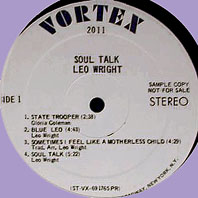 |
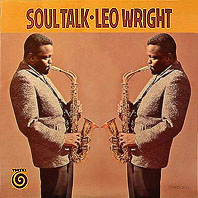 click image to enlarge |
Soul Talk / Leo Wright recorded: November 1, 1963 issued: 1963 VORTEX 2011 #A1 also on Atlantic Jazz: 12 Volume Box Set / Various Artists LEO WRIGHT (as; fl #A2); KENNY BURRELL (g); GLORIA COLEMAN (org); FRANKIE DUNLOP (dr); NESUHI ERTEGUN (prod.)
|
||
below: Soul Talk re-issue: March 2005 CD WATER Records 146 (RUNT LLC) |
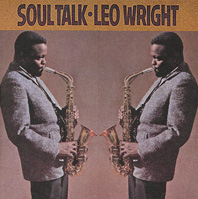 |
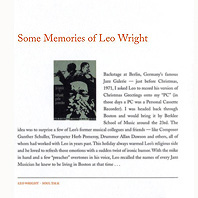 |
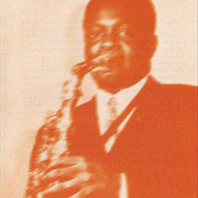 |
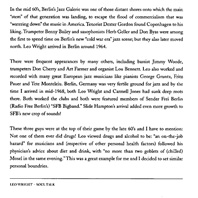 |
 |
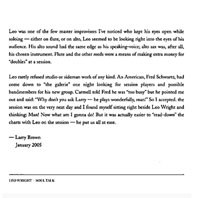 |
click images to enlarge | 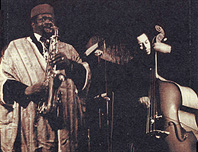 Leo with Bert Thompson at the Jazzgalerie in Berlin in 1969. |
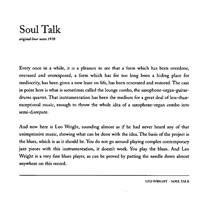 |
 |
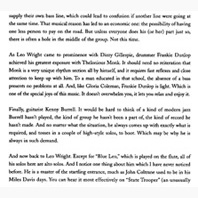 |
|
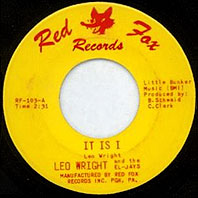 RED FOX RECORDS RF-103-A (UK) |
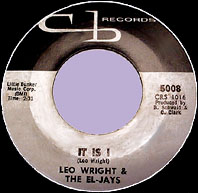 CB RECORDS 5008 |
It Is I / Leo Wright & The El-Jays recorded: 1964 issued: 7 Inch / 45 RPM, RED FOX RECORDS RF-103-A (UK) ; CB RECORDS 5008 ; #A1 also on Pittsburgh Favorite Oldies: For Lovers Only, Vol. 3, ITZY 5007 ; Dynamite Group Sounds Vol. 1, CD DYNAMITE RECORDS DGS 101 ; and on Mad Mike Moldies Vol. 1, LP NRM 1590 ; #B1 also on Instant Ecstasy, Vol. 2, INSTANT ECSTASY 1002, produced by B. Schwaid & C. Clark for these compilations see >> disco 6 Side A 1. It Is I (Leo Wright) Side B 1. I Wonder Note: Songtitle is 'Is It I' on 'Pittsburgh Favorite Oldies'. Note: This single also is part of the Northeast INSTANT ECSTASY Series Vol's 1 & 2 by Quantum Leap Productions (Vocal Group Harmony Gems from 1957- 66). These CD's contain a mixture of ballads and uptempo tunes from a variety of vocal groups. |
| Modern Jazz Studio Nr. 4 is one, Flute + Alto-Sax the other part of the same concert. | 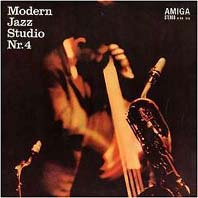 |
Modern Jazz Studio No. 4 / Leo Wright recorded: March 10, 1965 live in Dresden issued: 1965 (1970?) AMIGA 855215 (Ex-East-Germany) LEO WRIGHT (fl, as); "DR. BLUES" CANDY GREEN (p, voc, cl); ANDRÉ CONDOUANT (g); WOLFGANG KRAESSE (b); HARTWIG BARTZ (dr)
|
||
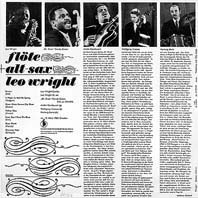 |
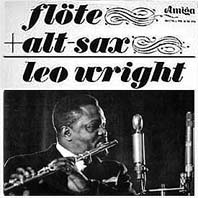 click images to enlarge |
Flute+Alto-Sax / Leo Wright recorded: March 10, 1965 live in Dresden issued: 1965 (or 67 ?) AMIGA 855056 (Ex-East-Germany) LEO WRIGHT (fl, as); "DR. BLUES" CANDY GREEN (p, voc, hca); ANDRÉ CONDOUANT (g); WOLFGANG KRAESSE (b); HARTWIG BARTZ (dr)
|
||
| Liner notes von Karlheinz Drechsel Leo Nash Wright, Candy 'Dr. Blues' Green und André Condouant gehören zur kontinuierlich anwachsenden Schar jener Jazzmusiker, die - aus Gründen der Rassen-Diskriminierung wie auch wegen der allgemein um sich greifenden wirtschaftlichen Misere des Jazz - ihren Wohnsitz von den USA nach Europa verlegt haben. André Condouant kommt von den Karibischen Inseln. Nach einigen Jahren Zwischenstation in New York, ging er 1954 nach Europa (er lebte 8 Jahre in Paris), wo er heute zu den vielversprechendsten Jazzgitarristen zählt. Candy Green ist gebürtiger Texaner, seine Wiege stand in Houston. In den Industriezentren des Nordens prägten der Jump-and-Shout-Stil, der Boogie Woogie und der ebenso harte wie flüssige Kansas-City-Swing sein Profil als Sänger und Pianist. Seine Vortragsart stellt eine eigenartige Mischung aus derber Blues-Realistik und eleganter Nachtklub-Atmosphäre dar. Der in Amerika erworbene Beiname 'Dr. Blues' spricht für sich. Leo Wright, spiritus rector und künstlerischer Mittelpunkt des eigens für das DDR-Gastspiel formierten Ouintetts, kommt ebenfalls aus Texas, dem Herkunftsland zahlreicher namhafter Blueskünstler und Jazzmusiker. Am 14.12. 1933 in Wichita Falls geboren, erhielt er schon im Kindesalter von seinem Vater, einem Saxophonisten in einer Rhythm & Blues Band, den ersten Saxophonunterricht. In der örtlichen Highschool-Band nahm die musikalische Entwicklung festere Formen an. Besondere Leistungen verhalfen Wright zu einem Stipendium an einem Texas-College, nach dessen erfolgreicher Absolvierung er sein Glück an der Musikakademie in San Francisco versuchte, die hohen Studiengebühren machten diesen Plan zunächst zunichte; er arbeitete deshalb einige Jahre als Altsaxophonist in San Francisco, bis die dadurch erzielten Ersparnisse endlich den Wunsch seines Lebens in Erfüllung gehen ließen. Das Saxophon-Studium erforderte jedoch, Iaut Schulgesetz, das zusätzliche Erlernen eines 'klassischen' Musikinstruments. So griff Leo Wright, obgleich sehr ungern, zur Flöte. Bis heute sieht er das Altsaxophon als sein 'eigentliches' Instrument an, weshalb es geradezu kurios anmutet, daß ihm ausgerechnet die Flöte immer wieder als Sprungbrett in seiner Laufbahn diente und die internationale Jazzkritik weit mehr den Flötisten als den Saxophonisten beachtet. Die Flöte verhalf Wright während der Wehrdienstzeit zur Aufnahme in ein Armee-Ensemble, dessen künstlerische Skala sich von der Sinfonik und Oper bis zur JazzCombo erstreckte, für Leo ein außerordentlich nützlich gewesenes 'Exerzierfeld'. Es war auch die Flöte, die ihm 1958 in New York ein Engagement bei Charles Mingus brachte und die ihn 1959 Mitglied des weltberühmten Quintetts von Dizzy Gillespie werden ließ. Speziell dieses Engagement machte den Namen Leo Wright über Nacht international populär: unermüdlicher Fleiß und Lerneifer hatten endlich ihren wohlverdienten Lohn getunden. Als Gillespie 1962 sein Quintett während einer Europa-Tournee überraschend auflöste, kehrte Wright nicht in die USA zurück. Seitdem erfreut sich sein überragendes Können in Jazz-Clubs, bei Konzerten und Festivals, bei Platten-, Funk- und Fernsehgesellschaften zwischen Stockholm und Rom, Paris und Prag immer größerer Wertschätzung. Während er als Flötist, er zählt heute zu den weltbesten seines Faches, einen gönzlich eigenen Weg geht, verfolgt er als Altsaxopho- nist in gerader Linie die klassische Charlie Parker-Schule. Er beherrscht sein Handwerkszeug aus dem FF, hat endgültig |
seinen Stil getunden und steht über den Dingen. Sein modernes, tief im Blues verwurzeltes Spiel, besticht durch die Klarheit des Aufbaus und der künstlerischen Aussage. Mit aggressivem Ton (auch er erinnert an Parker) steuert Leo Wright harmonisch exakt gebunden und gerade auf sein Ziel zu, unter Vermeidung endloser Chorusse, 'handfest' und fern von avantgardistischen Experimenten. Wright sagt seibst zu seiner Musik: "lch spiele so, wie ich es in meinem Innern empfinde. Warum soll ich, nur um supermodern zu erscheinen, mich und damit auch mein Publikum belügen?" Die westdeutschen Rhythmiker Wolfgang Kraesse und Hartwig Bartz sorgen in erster Linie für einen soliden Grund-Beat. Noch vor wenigen Jahren stand Hartwig Bartz als Schlagzeuger an der Spitze des westdeutschen Jazz-Poll (damals im Albert Mangelsdorff-Quintett), bis ihn eine schwere Krankheit zum Pausieren zwang. Jetzt steuert er offensichtlich seinem Comeback zu, was diese Aufnahmen deutlich belegen. Mit dem hart, zügig und gelöst gespielten 'Encore', das quasi als Solisten-Visitenkarte überreicht wird, besitzt die Platte einen außerordentlich geglückten und vehementen Auftakt. Wir spüren jenen erfri- schenden Zug van Jam-Atmosphäre, den leider so manche Jazz-Veranstaltung vermissen läßt, wie er jedoch dem gesamten Dresdener Konzert sein Gepräge gab. Das balladeske 'It Might As Well Be Spring' stellt das hervorragende Können des Flötisten Wright in den Mittelpunkt, sein Gefühl für dynamische Nuancierungen, seinen Sinn für zarte Töne, die er geschickt und geschmackvoll mit kraftvollen Passagen zu mischen versteht. Die Iyrischen Filigran-Figuren von A. Condouant sowie das initiative Zusammenspiel des Quintetts vervollständigen den vielapplaudierten Gesamteindruck. Vitale Blues-Atmosphäre à la Chicago und Kansas City bescheren dem 'Down Home Kansas City Blues' (Text und Musik von Candy Green), 'Kidney Stew' und die in ungewöhnlich schnellem Tempo vorgetragene Memphis Slim-Komposition 'Every Day I Have The Blues'. Hier ist vor allem 'Dr. Blues' in seinem Element, und wie er auf der Claviola, ganz in der Art der Mundharmonika-Blueskünstler der Südstaaten, sein 'Down Home' mitreißend zu interpretieren versteht, das ist eine Klasse für sich. Leo Wright versteht sich als Begleiter wie auch als Solist dem Gesamtcharakter ausgezeichnet anzupassen, wobei man sein Alt-Solo in 'Kidney Stew' als Musterbeispiel eines von Herzblut erfüllten Blues-Chorus bezeichnen darf. André Condouant zeigt, abgesehen von seiner enormen Technik und seinen vielfältigen Ideen als Solist, wie weit die Anwendungsmöglichkeiten der Gitarre gezogen sind, um einer kleinen Besetzung möglichst vielseitige Schattierungen zu verleihen (Gegenstimme im Sinne des Ruf-Antwort-Prinzips, 'BIäser'-Funktion im Satzspiel, emotioneller Steigerungseffekt in Riff-Passagen u. v. a. m.). Bei dem von Flöte und Gitarre unisono vorgestellten 'Blues March', dessen Melodik der Blueskollektion dieser Platte eine recht reizvolle Variante gibt, verblüfft Leo Wright mit seinem Vermögen, die Flöte in ein 'heißes' Instrument zu venwandeln, überraschend auch das modern angehauchte Solo Candy Greens, wozu offensichtlich André Condouant mit seinem vorausgegangenen Chorus aus Akkord-Attakken und Einzeltönen die Inspiration verlieh. Mit Gillespie's traditionsreichem 'Groovin´ High' kommen noch einmal alle Solisten zum Zuge, auch Hartwig Bartz, der im 8/8-Wechsel über achtzig Takte seine blendende Technik demonstriert. Leo Wright spielt den ausgedehntesten Alt-Chorus des Konzertes, mit dem er nur unterstreicht, daß er einer der bemerkenswertesten Jazzmusiker unserer Tage ist. | ||
| Promotional Single | 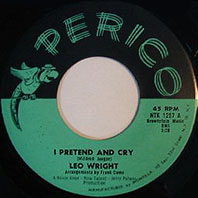 |
I Pretend And Cry / Leo Wright issued: 1965 PERICO Side A 1. I Pretend And Cry Side B 1. Bops-A-Bops Love |
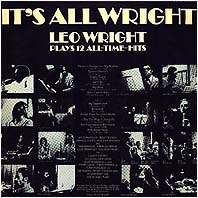 |
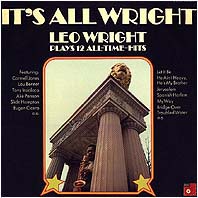 click images to enlarge 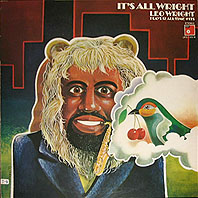 |
It's All Wright / Leo Wright Plays 12 All Time Hits recorded: February 26 & 27, 1972 - March 1 & 5, 1972 at Sono-Press-Sudio in Berlin issues: 1972 MPS 21375 ; BASF 20-21375-7 (Germany) ; UPS-185-B Promotional Sample LP (Japan) [see cover below] #A3 also on 25 Goldene Instrumental Welterfolge - Various Artists CD KOCH >> see Carmell Jones' disco page 6 LEO WRIGHT (cl, as, fl); MILO PAVLOVIC, CARMELL JONES, ROLF ERICSON, ACK VAN ROOYEN (tp); ÅKE PERSSON, SLIDE HAMPTON, CHARLES ORIEUX, LOU BLACKBURN (tb); EUGEN CICERO (p); LOU BENNETT (org #A3); PIERRE LOUIS, INGO KRAMER (g); JEAN WARLAND (el-b); TONY INZALACO (dr); PETER LEWISON, DAI BOWEN (perc); JERRY VAN ROOYEN (arr., cond.); GUNTHER HENNE (prod.)
|
||
Note: SABA/MPS Records 20000 Series: usually given as MPS or BASF or MPS/BASF |
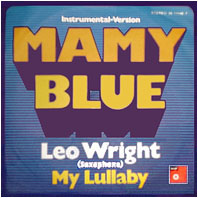 |
Mamy Blue - My Lullaby / Leo Wright recorded: 1970 or 71 ? issued: 1973, 7 Inch/45 RPM, BASF 05 11148-7 publishers: Side A: Intro, Side B:Toledo LEO WRIGHT (as), further musicians unknown Side A 1. Mamy Blue [instrumental version] (H. Giraud) Side B 1. My Lullaby [instrumental version] (Heider/Relin) |
|
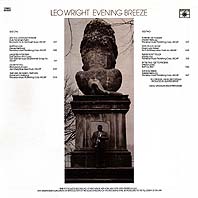 |
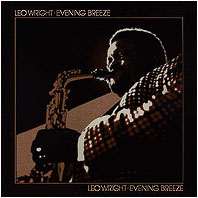 ROULETTE SR-5007 click images to enlarge 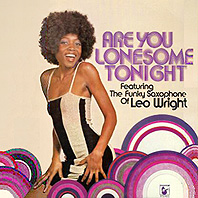 1976 HANSA 27854 |
Evening Breeze / Leo Wright recorded: 1976 issued: 1977 ROULETTE SR-5007 (stereo) (German pressing with US cover) ; also as Are You Lonesome Tonight - Featuring The Funky Saxophone Of Leo Wright 1976 HANSA 27854 OT ; #A1 & #B5 also on 7" HANSA/ARIOLA) ; #A1,3 & #B5 also issued on Magic Sax - Various Artists 1979 LP HANSA 200443-320 ; #A2 also on 20 Super Love Songs - Various Artists LP HANSA 28013 GT, see >> disco 5 LEO WRIGHT (as, fl) /w THE RICHARD SEDDIN ORCHESTRA ; PETER SCHIRMANN (arr.); GÜNTER HENNE (prod.)
|
||
 click image to enlarge |
Flamingo - Please Don´t Touch / Leo Wright recorded: 1978 in Berlin issued: 7 Inch / 45 RPM, TOLEDO 112.507 (Germany) Intercord Distribution #A1 also issued on Magic Sax - Various Artists, 1979 LP HANSA 200443-320 and on The London Tavern Disco, LP CRAZY CAT CC 15.014 (Brazil) for both see >> disco 5 LEO WRIGHT (as) /w unknown personnel Side A 1. Flamingo (Anderson Grouyal; arr. & cond. by Micky Bahner) Side B 1. Please Don´t Touch (Heider/Jay; arr. by Heider) |
|
| Review:Two lost soul jazz classic from the Atlantic catalog! Hank Crawford's Soul Clinic is one of the few albums we really like by him and it features the soulful altoist playing in a group with David Fathead Newman and some other lesser-known players who are nice and soulful. The set's got some warm mellow instrumental versions of blues classics, plus a few originals like 'Lorelei's Lament', 'Blue Stone', and 'Playmates'. Even better is Blues Shout, one of the rare few albums cut by the amazing alto and flute player Leo Wright. The record's got a beautiful mix of soul jazz and slightly modern lyricism, and Wright's tone and projection are impeccable throughout. Titles on the record include 'Sigi', 'Blues Shout', 'Indian Summer', 'The Wind' and 'Two Moods' - and players include Junior Mance, Richard Williams, and Charlie Persip. |
 |
The Soul Clinic - Blues Shout / Hank Crawford - Leo Wright 2 LPs on 1 CD, released: July 27, 1999 Jazz On ATLANTIC RECORDS, COLLECTABLES RECORDS COL 6281 The Soul Clinic was originally released in 1961 as ATLANTIC 1372 HANK CRAWFORD (as, p); PHILLIP GUILBEAU (tp); JOHN HUNT (tp, fl-h); DAVID FATHEAD NEWMAN (ts); LEROY "HOG" COOPER (bar-s); EDGAR WILLIS (b); BRUNO CARR, MILT TURNER (dr) Blues Shout was originally released in 1960 as ATLANTIC 1358 LEO WRIGHT (as, fl); RICHARD WILLIAMS (tp); HARRY LOOKOFSKY (v); JUNIOR MANCE (p); ART DAVIS (b); CHARLIE PERSIP (dr)
|
||
Leo Wright´s songs appear on:
| Although Phil Woods gets top billing on this Philology CD compilation of two mid-'60s broadcasts by DJ Alan Grant from the Half Note in New York City, he is only present on one of the two airchecks, with both groups led by tenor saxophonist Al Cohn. The first five tracks feature the two musicians with a rhythm section consisting of pianist Dave Frishberg, bassist Major Holley, and drummer Mousie Alexander. Both men shine in 'Yardbird Suite', though there seems to be a bit of stumbling in the introduction to 'It's A Wonderful World'. Singer Jimmy Rushing is added for a rousing 'Deed I Do', though the vocalist's microphone doesn't seem to be working too well, and the sound does improve a good bit in 'I Want A Little Girl' and for a brisk, swinging 'All Of Me'.The last six selections find Cohn with fellow tenor Zoot Sims and Richie Kamuca, along with Frishberg, bassist Tommy Potter, and drummer Mel Lewis. The 3-reed front line opens with a hard-charging 'Broadway', followed by a rapid-fire take of Lester Young's 'Tickle Toe'. Jimmy Rushing is again a special attraction, stealing the show | 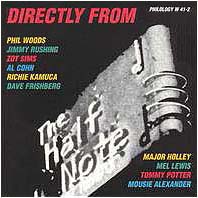
|
Directly From The Half Note / Phil Woods issued: 1965 or 66, CD PHILOLOGY 41 PHILOLOGY W12-W124453 -E (England), -G (Germany), -U (USA) Dave Frishberg (p); Richie Kamuca, Al Cohn, Zoot Sims (ts); Phil Woods (cl, as); Jimmy Rushing (voc); Major Holley (b); Mel Lewis, Mousie Alexander (dr); Paolo Piangiarelli (prod)
|
|||
Leo Wright also appears on the following recordings:
| Leo Wright never played trumpet - the EP 'Afro-Cubists / Kenny Graham' mentioned here before, lists a British trumpet player of the same name ! |
| Review: This SteepleChase CD for the first time releases music from a September 17, 1959 Copenhagen concert featuring trumpeter Dizzy Gillespie and his Quintet of the period (which includes altoist Leo Wright, pianist Junior Mance, bassist Art Davis and drummer Teddy Stewart). Wright (who doubled on flute) was a perfectly suitable musical partner for Gillespie (staying with the group until 1962) and was always able to take assertive solos without trying to stealing the spotlight from the trumpeter. Diz is in good spirits throughout these two sets, singing a good-humored 'Ooh-Shoo-Be-Doo-Bee' and scatting furiously on 'Lady Be Good'. His trumpet chops are in excellent form and his solos are as complex as ever. Highlights include 'My Man', 'Wheatleigh Hall', 'Night in Tunisia' and 'Woody'n You'. | 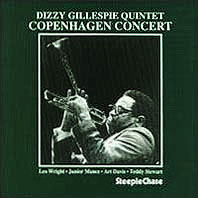 |
Copenhagen Concert / Dizzy Gillespie Quintet recorded: September 17, 1959 live in Copenhagen issues: STEEPLE CHASE 6024 ; (CD 6423489 ?) ; 1992 CD STEEPLE CHASE 36024 DIZZY GILLESPIE (tp); LEO WRIGHT (as); JUNIOR MANCE (p); ART DAVIS (b);TEDDY STEWART (dr)
|
||
| Review: Virgil Gonsalves, a long-forgotten but talented baritone/saxophonist, led three record dates in the 1950s of which the VSOP reissue LP was the final one. The first side, which includes such songs as 'Stablemates', 'A Sunday Kind of Love' and one of the earliest cover versions of John Coltrane's 'Moment's Notice', features a 13-piece big band (five trumpets, five saxes and a 3-piece rhythm section) filled with mostly obscure players; the exceptions are altoist Leo Wright, pianist Junior Mance and bassist Eddie Kahn. The flip side has a hardbop-oriented sextet featuring Gonsalves, trumpeter Mike Downs and tenor-saxophonist Dan Patiris as the main soloists. This is an LP that should delight collectors who enjoy discovering 'new' talent for the musicians' lack of name recognition does not hide their impressive talent. | 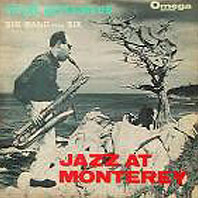 |
Jazz At Monterey / The Virgil Gonsalves Big Band Plus Six recorded: 1959 issues: OMEGA RECORDS OSL-47 (stereo) ; OMEGA RECORDS 27 ; OMEGA OML 1047 ; re-issued: 1985 as The Virgil Gonsalves Sextet LP VSOP 24 (stereo) (VSOP=Very Special Old Phonography), yellow label with black print Virgil Gonsalves with the Jerry Cournoyer Big Band, VIRGIL GONSALVES (bar-s); MIKE DOWNS (tp); LEO WRIGHT (as); DAN PATIRIS (ts); JUNIOR MANCE (p); EDDIE KAHN (b) etc. 1. Stablemates 2. A Sunday Kind Of Love 3. Moments Notice 4. Steresis 5. Blue Bird 6. Little Mellonae 7. Sharon 8. Oasis 9. Lover Man |
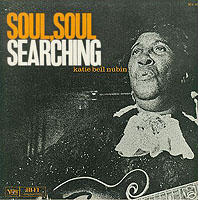 |
Soul, Soul Searching / Katie Bell Nubin recorded: January 1960 in NYC issues: Verve MG V-8372 (not released) ; Verve MGVS 6147 (not released?); transfered to Verve MGV 3004 Katie Bell Nubin (voc); Dizzy Gillespie (tp, voc); Leo Wright (as); Junior Mance or Sister Rosetta Tharpe (p); Les Spann (g); Art Davis (b); Lex Humphries (dr)
|
|||
| Review: The music is predictable but pleasing on this consistent CD, recorded at the 1960 Newport Jazz Festival. Cannonball Adderley's Quintet (with trumpeter Nat Adderley) swings hard on 'Work Song' and 'Stay on It', Gerry Mulligan's Concert Jazz Band sounds fine on three songs (although this version of 'Blueport' does not quite compare to Mulligan's classic matchup with flugelhornist Clark Terry), the Oscar Peterson Trio jams 2 numbers and Dizzy Gillespie's three song miniset is highlighted by 'Night in Tunisia'. Nothing that unusual occurs in any of the performances but the playing is up-to-par and occasionally exciting. | 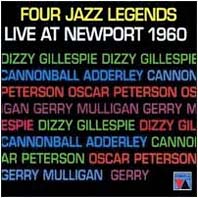 |
Four Jazz Legends Live At Newport 1960 / Various Artists recorded: July 1960 at the Newport Jazz Festival, Newport/RI issues: 1960 VANGUARD CLASSICS 3025 ; OMEGA ; September 25, 1994 CD VANGUARD CLASSICS 3025 #1,2 Cannonball Adderley Quintet: CANNONBALL ADDERLEY (as); NAT ADDERLEY (tp, fl-h); BARRY HARRIS (p); SAM JONES (b); LOUIS HAYES (dr); #3-5 Gerry Mulligan Concert Jazz Band: GERRY MULLIGAN, GENE ALLEN (bar-s); DON FERRARA, PHIL SUNKEL, NICK TRAVIS (tp); WAYNE ANDRE, ALAN RAPH, BOB BROOKMEYER (tb); JIM REIDER (ts); GENE QUILL, DICK MELDONIAN (as); BILL TAKAS (b); MEL LEWIS (dr); #6,7 Oscar Peterson Trio: O. PETERSON (p); RAY BROWN (b); ED THIGPEN (dr); #8-10 Dizzy Gillespie Quintet: DIZZY GILLESPIE (tp); LEO WRIGHT (as,fl); JUNIOR MANCE (p); ART DAVIS (b); AL DREARES (dr)
|
||
| Live At Newport 1960 / Dizzy Gillespie recorded: July 1960 at Newport Jazz Festival, Newport/RI issued: OMEGA 3025 DIZZY GILLESPIE(tp); LEO WRIGHT (as, fl); JUNIOR MANCE (p); ART DAVIS (b); AL DREARES (dr) 1. Lorraine (Dizzy Gillespie) 2. Norm's Norm 3. A Night in Tunisia (Dizzy Gillespie) |
||
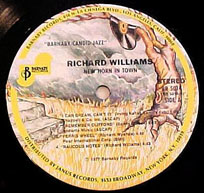
|
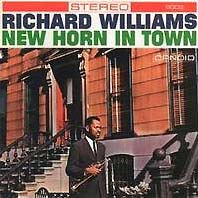 |
New Horn in Town / Richard Williams recorded: September 27, 1960 at Nola Penthouse Sound Studios issues: CANDID SMJ 6181 ; CANDID CJM 8003 (mono) ; PACIFIC JAZZ 54944 ; BARNABY/CANDID BR-5014 ; CANDIDO-TEICHIKU TECW-20377 (Japan) ; 1985 CANDID 9003 ; 1987 CD CANDID CCD-79003, October 1987 CD CANDID 5614668 RICHARD WILLIAMS (tp); LEO WRIGHT (fl, as); RICHARD WYANDS (p); REGINALD “REGGIE” WORKMAN (b); BOBBY THOMAS (dr)
|
|||
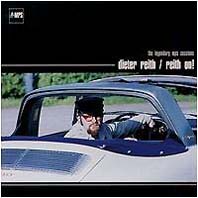 |
Reith On!: The Legendary MPS Sessions / Dieter Reith recorded: 1960-1964 ? issues: July 1979 MPS ; BLUE NOTE RECORDS ; 1998 CAMERON HILL ; CD MPS/MOTOR MUSIC 557 423 DIETER REITH (org, p, arr); ACK VAN ROOYEN (tp, fl-h); LEO WRIGHT, GERD DUDEK (fl, sax); JOKI FREUND, BERND FISCHER (sax); KNUT KIESEWETTER (voc); EBERHARD WEBER, PETER WITTE (b); CHARLY ANTOLINI, KENNY CLARKE, ROLAND WITTICH (dr); KURT BONG (bgo); HERMANN MUTSCHLER (timb); HANS GEORG BRUNNER-SCHWER (prod, engineer); WILLI FRUTH (prod); ROLF DONNER (engineer)
|
|||
 |
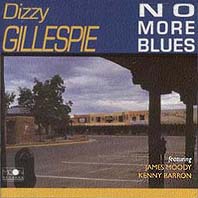 |
No More Blues / Dizzy Gillespie recorded: 1960 in Rome/Italy (#1-7), 1965 in London/UK (#8-11) issues: April 19, 1995 MOON MCD 065-2 #1-7 DIZZY GILLESPIE (tp, voc); LEO WRIGHT (as, fl); JUNIOR MANCE (p); ART DAVIS (b); TEDDY STEWART (dr) #8-11 DIZZY GILLESPIE (tp); JAMES MOODY (as, fl); KENNY BARRON (p); CHRIS WHITE (b); RUDY COLLINS (dr) 1. Tour De Force (Gillespie) 2. I Found A Million Dollar Baby In The Five And Ten Cent Store (Warren/Rose/Devon) 3. Willow Weep For Me (Ronnell) 4. Lorraine (Gillespie) 5. Ooh-Shoo-Be-Doo-Bee (Carroll/Graham) 6. Quickly Hall (Gillespie) 7. I Can't Get Started (Dyke) 8. And Then ... She Stopped (Gillespie) 9. Tin Tin Deo (Gillespie/Pozo) 10. Mm-Mm (Moody) 11. No More Blues (Jobim) Note: Other issues I´ve found are: PHILIPS TIME 9 (Eu) 430793BE and New Wave (No More Blues) MERCURY WING RECORDS MGW12318, but they´re probably different from the Moon issue. |
| Review: Lalo Schifrin exploded onto the American jazz scene with this, his Suite for Trumpet and Brass Orchestra, written especially for Dizzy Gillespie. Gillespiana set the standard for New York studio jazz orchestra recordings in the early 60s - and remains a milestone in Gillespie's illustrious career. Schifrin's love and respect for the trumpet player is evident throughout. And Dizzy responds in kind with some dynamic, exciting interchanges. Nice spots for Schifrin, Leo Wright and Candido Camero too. This CD is worth repeated listens, even some studying - does anyone else hear the influence of Yma Sumac in 'Panamericana' ? Schifrin's musical career seems devoted to destroying any concept of musical anachronism]. Schifrin's very formal charts mingle perfectly here with the improvisational talents of its featured players. Truly classic American music. Schifrin conducted a reunion band performing the Gillespiana Suite at Carnegie Hall in 1995, featuring Jon Faddis in honor of the late Mr. Gillespie. | 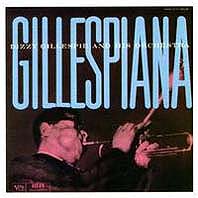 |
Gillespiana / Dizzy Gillespie And His Orchestra recorded: November 14-15 (#1-4), 16 (#5), 1960 in New York City original release: 1960 DoLP VERVE MGV 8394 issues: VERVE V6-8394 ; VERVE (Jap) 23MJ3395 ; VERVE CD 314 51 9809-2 #1,4 also on Dizzy´s Diamonds: Best Of The Verve Years VERVE CD 314 513 875-2; #4 also on Dizzy Gillespie: Jazz Masters 10 VERVE CD 314 516 319-2 ; #5 also on Dizzy Gillespie Talkin' Verve VERVE CD 314 533 846-2 DIZZY GILLESPIE, CLARK TERRY, ERNIE ROYAL, JOE WILDER, JOHN FROSK (tp); FRANK REHAK, URBIE GREEN, BRITT WOODMAN (tb); PAUL FAULISE (b-tb); LEO WRIGHT (as, fl); JULIUS WATKINS, GUNTHER SCHULLER (fr-h); JIMMY BUFFINGTON, AL RICHMAN (fr-h #1-4); MORRIS SECON, WILLIAM LESTER (fr-h #5); DON BUTTERFIELD (tu); LALO SCHIFRIN (p, arr, comp.); ART DAVIS (b); CHUCK LAMPKIN (dr); CANDIDO CAMERO (cga); JACK DEL RIO (bgo); WILLIE RODRIGUEZ (timb); NORMAN GRANZ (prod) 1. Prelude 2. Pan Americana 3. Blues 4. Africana 5. Toccata Notes by Gunther Schuller (VERVE MGV-8394) & John McDonough (VERVE 314 519809-2). Note: A 1964 TV special titled “Dizzy Gillespie” features a quintet performance of Gillespiana (date unknown) with D. GILLESPIE, L. WRIGHT, L. SCHIFRIN, C. LAMPKIN and ROBERT CUNNINGHAM (perc). Gillespie performed 'Blues' with an all-star group (without Schifrin) at Carnegie Hall, March 27, 1965, for 'Charlie Parker 10th Memorial Concert' (LIMELIGHT LS86017, 826 985-2 [CD]). |
| Reviews: Dizzy Gillespie's 1960 Paris concert features
his quintet with pianist Lalo Schifrin and consists primarily of Schifrin's
'Gillespiana Suite', which had just been recorded in the studio for Verve
during the week prior to this performance. This version stands up well
to the studio version, as it obviously had been well-rehearsed by the
time the group went on the road. The band also includes Leo Wright (on
flute and tenor sax), bassist Art Davis, and drummer Chuck Lampkin. Percussionist
Candido is added for an exciting, tension-building arrangement of 'Caravan'.
This enjoyable CD is warmly recommended. -- This well-recorded concert event catches Gillespie's quintet live at the Salle Pleyel in Paris only five days after the original recording of Schifrin's magnum opus. The 53-minute performance is historically significant because Gillespie was rarely able to perform the entire five-part suite in public (though he often played 'Blues' throughout the remainder of his career) and it was thought that no performance of this suite had been recorded. What's more, Schifrin's 20-piece brass section is |
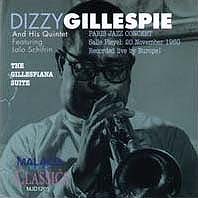
|
The Gillespiana Suite - Paris Jazz Concert 1960 / Dizzy Gillespie And His Quintet Featuring Lalo Schifrin recorded: November 20, 1960, live at Salle Pleyel, Paris issued: 1998 CD MALACO JAZZ CLASSICS MJD-1205 ; 1998 as Paris Jazz Concert MALACO 1201 ; also as Live In Paris ; 2001 as Dizzy Gillespie Live - Pleyel 25 November 1960 (see below) DIZZY GILLESPIE (tp); ART DAVIS (basset-h); LEO WRIGHT (as, fl); LALO SCHIFRIN (p); CHUCK LAMPKIN (dr); CANDIDO CAMERO (cga); produced live by Europe1
Note: Malaco indicates the above date as November 20, RTE (Fr) and Trema indicates the date as November 25. Notes by André Clergeat on Malaco MJD-1205. #6 listed as Candido/Caravan', #7 listed as 'Finale' and credited to Lalo Schifrin on RTE and Trema. |
|||
| same concert as above see also >> discography 7 for other issues! |
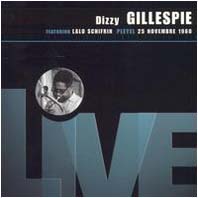
|
Live - Pleyel, 25 Novembre 1960 / Dizzy Gillespie Featuring Lalo Schifrin recorded: November 25, 1960 live at Salle Pleyel, Paris issues: 1999 CD TREMA 710585 ; 2001 CD RTE (Fr) 710585 DIZZY GILLESPIE (tp); ART DAVIS (basset-h); LEO WRIGHT (fl, as); LALO SCHIFRIN (p); CHUCK LAMPKIN (dr); CANDIDO (cga) ; FRANK TENOT (prod); MARC EXIGA (exec. prod); liner notes by André Clergeat. The Gillespiana Suite - 1. Prelude - 2. Blues - 3. Panamericana - 4. Africana - 5. Toccata - 6. Candido / Caravan - 7. Finale |
|
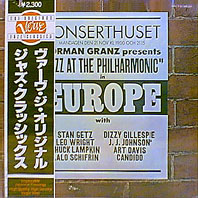
|
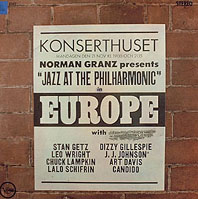 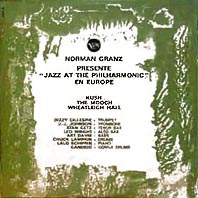 VERVE 3641 VERVE 3641 |
Jazz At The Philharmonic In Europe Vol. 4 recorded: November 21, 1960 live at the Konserthuset, Stockholm/Sweden issued: VERVE V/V6-8542 ; 1964 LP VERVE 3641 (France) #1 also on 1974 original Japanese VERVE pressing & 1981 VERVE UMV-2568 (Japan) DIZZY GILLESPIE (tp); J. J. JOHNSON (tb); STAN GETZ (ts); LEO WRIGHT (as, fl); LALO SCHIFRIN (p); ART DAVIS (b); CHUCK LAMPKIN (d); CANDIDO CAMERO (cga); produced by Norman Granz Side A 1. Kush (Dizzy Gillespie) Side B 1. The Mooche (Duke Ellington) 2. Wheatleigh Hall (Dizzy Gillespie) [ Jazz At The Philharmonic In Europe Vol. 1–4 ] #1,2 from Volume 1 VERVE V/V6-8539 ; #3-5 from Volume 4 VERVE V/V6-8542, also on VLP9048 ; #6-12 from Volume 3 VERVE V/V6-8541, also on VERVE V(6)854 ; #13-15 from Volume 2 VERVE V(6)8540, VLP9046 ; #1-5,12 also on 1973 DoLP VERVE 2V6S-8823 (US) 'Special Disc Jockey' issue; #3,13,15 also on 1981 VERVE UMV-2568 (Japan) (mono); #11 also on BEAN (It) 01 ; #12 also on VLP9048, VERVE (E) VLP9045 ; #1-8,10-15 & 3 other tracks (I Waited For You, Trotting, You Go To My Head) on VERVE V6-8542 and 68539-42. [Note: This is not the same performance issued on Verve MGV6-8541 as listed under Jazz at the Philharmonic.] DIZZY GILLESPIE (tp #1-5,14,15); ROY ELDRIDGE (tp #6-12); J. J. JOHNSON (tb #1-5,13, 15); BENNY CARTER (as #1,2,6-10,12); LEO WRIGHT (as, fl #3-5); JULIAN 'CANNONBALL' ADDERLEY (as #1,2); STAN GETZ (ts #3-5,11,13-15); COLEMAN HAWKINS, DON BYAS (ts #6-12); LALO SCHIFRIN (p #1-12); VICTOR FELDMAN (p, vib #13-15); ART DAVIS (b #1- 12); SAM JONES (b #13-15); CHUCK LAMPKIN (dr #1-5); JO JONES (dr #6-12); LOUIS HAYES (dr #13-15); CANDIDO CAMERO (cga #3-5); produced by Norman Granz 1. Bernie's Tune 2. Swedish Jam 3. Kush (Dizzy Gillespie) 4. The Mooche (Duke Ellington) 5. Wheatleigh Hall (Dizzy Gillespie) 6. (Back Home Again In) Indiana 7. Take the "A" Train (Billy Strayhorn) 8. These Foolish Things 9. Yesterdays (Jerome Kern) 10. The Nearness of You 11. A Jazz Portrait of Brigitte Bardot 12. All the Things You Are (Jerome Kern/Oscar Hammerstein) 13. Bop 'N Boogie 14. Yesterdays 15. Sweet Georgia Brown |
|
| Dizzy Gillespie Quintet (unissued) recorded: November 22, 1960 at Konserthuset Stockholm/Sweden DIZZY GILLESPIE (tp #1, voc #1,3); LEO WRIGHT (as, fl #1,2); LALO SCHIFRIN (p); ART DAVIS (b); CHUCK LAMPKIN (dr) 1. Blues After Dark 2. Lady Be Good 3. My Man |
||
| Europa Jazz: Dizzy Gillespie - Gerry Mulligan recorded: live 1960-61(#1-3), 1960 (#4-6) issued: early 70ies, CURCIO / I GIGANTI DEL JAZZ GJ-30 (Italy) (gatefold cover) #1-3 GERRY MULLIGAN /w Sextet incl. BUDDY RICH (#1); /w Quartet (#2); /w WOODY HERMAN ORCHESTRA incl. ZOOT SIMS, AL COHN, STAN GETZ (#3); #4-6 DIZZY GILLESPIE /w Quintet incl. BOBBY HACKETT (#4); /w LEO WRIGHT (as, fl), LALO SCHIFRIN (p), ART DAVIS (b), CHUCK LAMPKIN (dr), CANDIDO CAMERO, WILLIE RODRIGUEZ, JACK DEL RIO (cga, bgo, kettledrum) (#5,6) 1. I Never Knew 2. Jeru 3. Four Brothers 4. S´Wonderful 5. Manteca 6. St. Thomas Note: another internet source says that #1 was recorded July 1, and #3 July 3, 1966 live at Newport/Rhode Island. |
||
| Note: The information about this recording seems to be incomplete, because it doesn´t list the tracks by Gerry Mulligan. Internet sources vary, so I´m not sure whether both issues (EUROPA JAZZ and I GIGANTI DEL JAZZ) are identical and if 'Emanon' also appears on the recording above. | Dizzy Gillespie - Gerry Mulligan Concert, Europe: c. 1960-61 issues: 1960 EUROPA JAZZ EJ-1024 (Italy) ; early 70ies, I GIGANTI DEL JAZZ GJ-30 (Italy) DIZZY GILLESPIE (#1-3), CLARK TERRY, CARL "BAMA" WARWICK, NICK TRAVIS (#3) (tp); GEORGE MATTHEWS, BRITT WOODMAN, PAUL FAULISE, JIMMY KNEPPER (tb #3); LEO WRIGHT (as, fl); JULIUS WATKINS, GUNTHER SCHULLER, JOHN BARROWS (fr-h #3); DON BUTTERFIELD (tu #3); LALO SCHIFRIN (p); ART DAVIS (b); CHUCK LAMPKIN (dr); CANDIDO CAMERO, WILLIE RODRIGUEZ, JACK DEL RIO (cga, bgo, kettledrum #1,2) 1. Manteca 2. St. Thomas 3. Emanon Note: Other titles by Gerry Mulligan without Lalo Schifrin. |
|
| 1 2 3 biography I discography 1 2 3 4 (original) 5 6 7 8 9 (compilations) I press |
